In this guide, we’ll explore what herbs can rabbits safely eat, ensuring your furry friend can enjoy a diverse and healthy diet. Have you ever watched your rabbit nibble on fresh greens and wondered what herbs can rabbits safely eat? Rabbits are natural foragers, and their diet can be greatly enriched by adding a variety of herbs. However, not all herbs are safe for these delicate creatures. Dive in to learn how to make mealtime more exciting for your bunny. From common kitchen staples to unique garden finds, discover what herbs rabbits can safely eat to keep your rabbit happy and healthy.
What Herbs Can Rabbits Safely Eat? Safe and Tasty Options
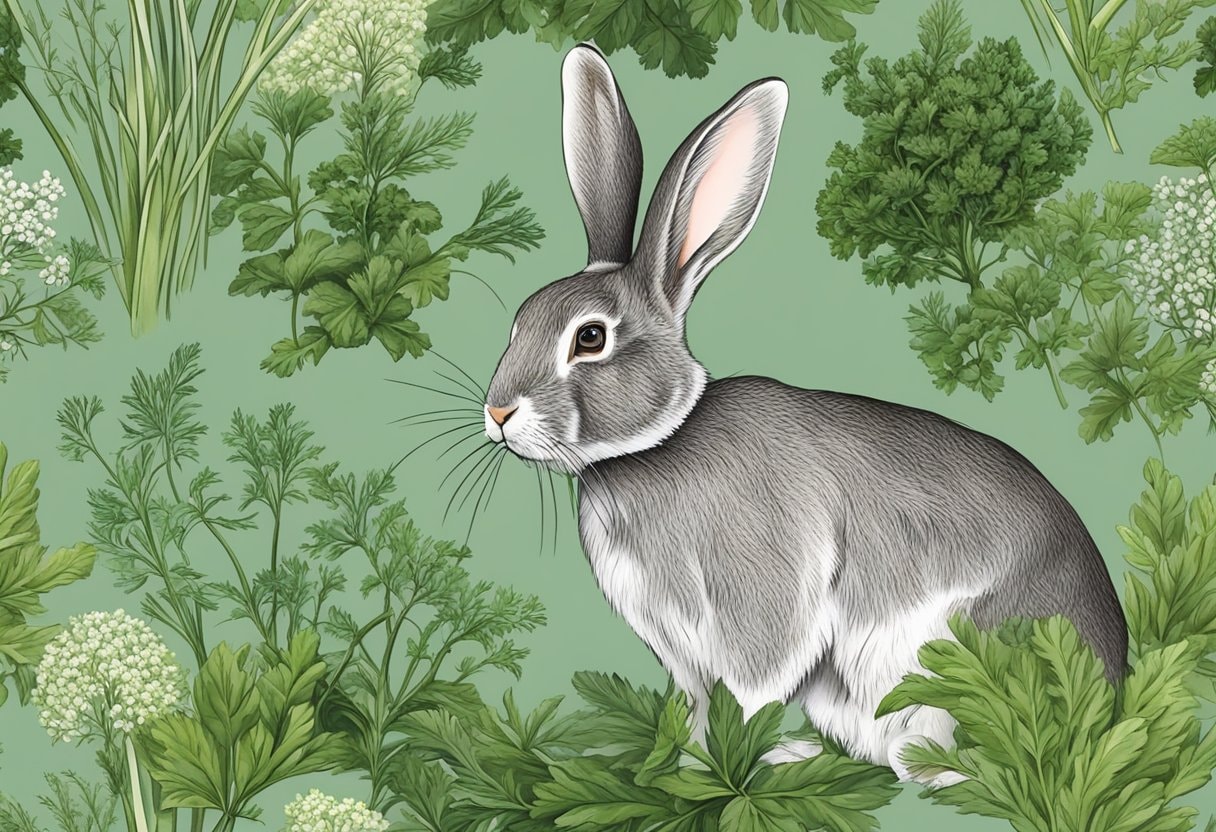
Our pet bunnies love fresh herbs and greens! Knowing what herbs rabbits can safely eat is essential! Choosing the right herbs for your rabbit can be both fun and rewarding.
It’s important to remember that not all herbs are safe for rabbits. Certain herbs can be toxic and should be avoided. Adding the right herbs to your rabbit’s diet can boost their health and happiness.
In this blog post, I’ll share What Herbs Can Rabbits Safely Eat and which ones to avoid. This will help you create a balanced and nutritious diet for your furry friend. Let’s dive into herbs and ensure our rabbits stay healthy and happy!
Key Takeaways
- Rabbits require a diet rich in fiber, supplemented with fresh vegetables and select herbs for enhanced nutrition, ensuring their well-being and contentment. Your rabbit can savor a variety of herbs that are not only flavorful but also beneficial for their health, ranging from basil to dill.
- When offering certain herbs to your rabbit, moderation is key. While herbs like cilantro and thyme can provide significant health benefits, they should be given sparingly and in appropriate quantities.
- While many herbs are safe and beneficial for rabbits, some, such as chives and leeks, can be harmful and should be avoided to protect your rabbit’s health.
- When allowing your rabbit to explore the garden, prioritize their safety by avoiding pesticides and ensuring all plants are non-toxic. Introducing herbs into your rabbit’s diet can enhance their health and provide dietary variety. It’s essential to offer fresh, properly prepared herbs and monitor serving sizes carefully for their well-being.
- Monitoring your rabbit’s health is crucial, especially when introducing new herbs to their diet. Look for signs of good digestion and be vigilant about common digestive issues that may arise.
Understanding Rabbit Diet Basics and What Herbs Can Rabbits Safely Eat
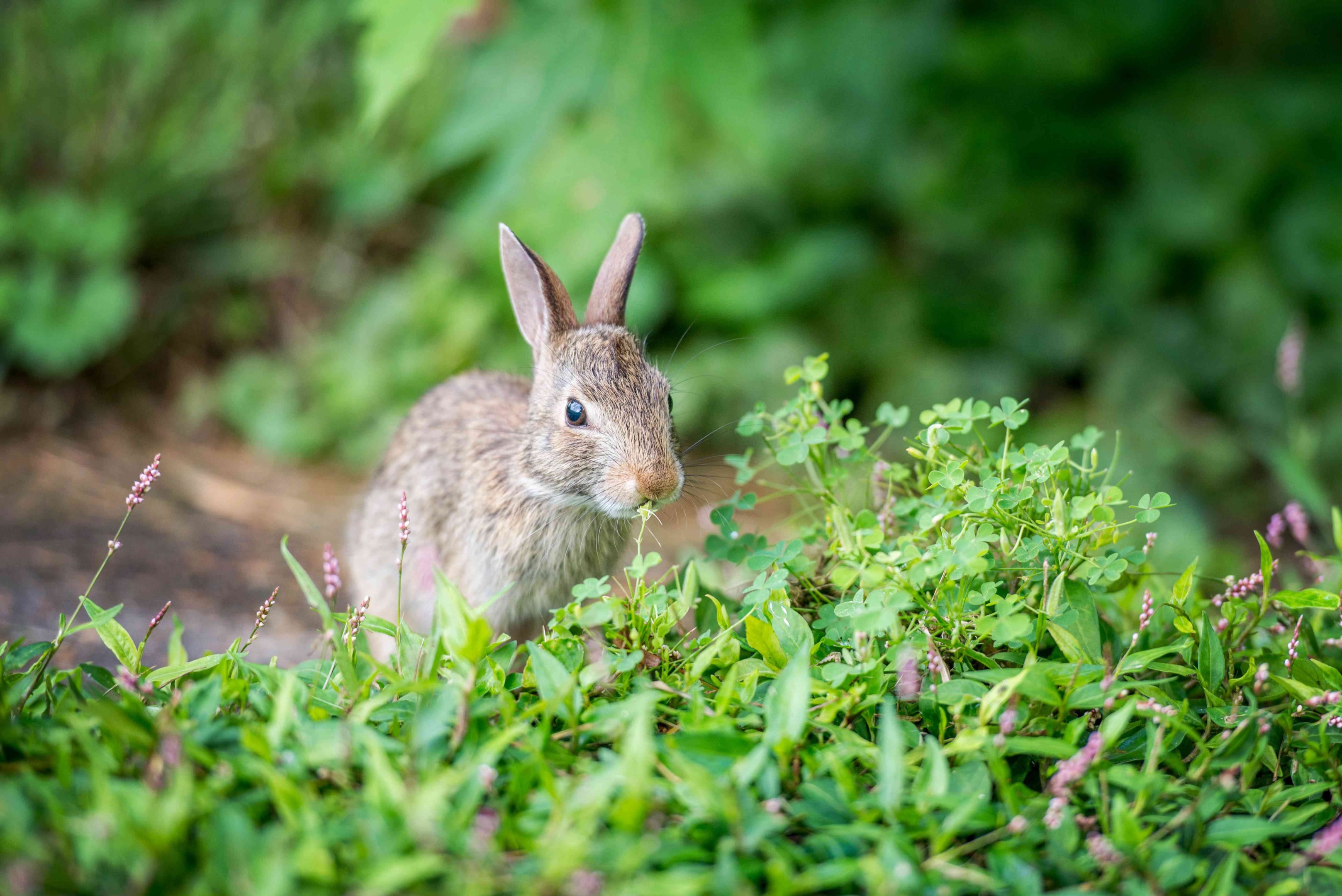
Rabbits need a diet high in fiber with fresh vegetables and special herbs for added nutrition. The right food choices keep your rabbit healthy and happy.
The Role of Fiber
Fiber is very important for rabbits. It helps their digestive system work properly. Hay is the main source of fiber in a rabbit’s diet.
Timothy hay is the best kind because it’s high in fiber and low in calories. Other good types of hay include orchard grass and meadow hay. Hay should make up most of a rabbit’s diet.
Fresh hay should be available all the time. It keeps their teeth from growing too long and helps prevent digestive issues. Make sure the hay is clean and free from mold or dust.
Safe Fresh Foods
Fresh vegetables are an essential part of a rabbit’s diet. They provide vitamins and minerals. Leafy greens are the best. Some safe veggies include romaine lettuce, carrot tops, parsley, collard greens, and kale. You can give 1-2 cups of vegetables for every four pounds of body weight. Introduce new veggies slowly.
Herbs to Supplement Your Rabbit’s Diet
Herbs are a great way to mix things up and boost your rabbit’s nutrition! Some herbs have health benefits, too. Lavender has anti-fungal properties and helps boost the immune system. It can also act as a local anesthetic when applied topically. Find more about lavender benefits for rabbits here.
Rosemary can soothe a nervous rabbit and even help with arthritis. Learn more about rosemary for rabbits here. Fresh herbs should be given in small amounts. Always make sure you’re offering safe and non-toxic herbs. Rotate the herbs to provide a good mix of nutrients and benefits.

Did You Know?
Never feed rabbits onions, garlic, or potatoes. These can be toxic. Always wash vegetables thoroughly to remove pesticides and chemicals.
What Herbs Can Rabbits Safely Eat: Recommended Herbs for Rabbits
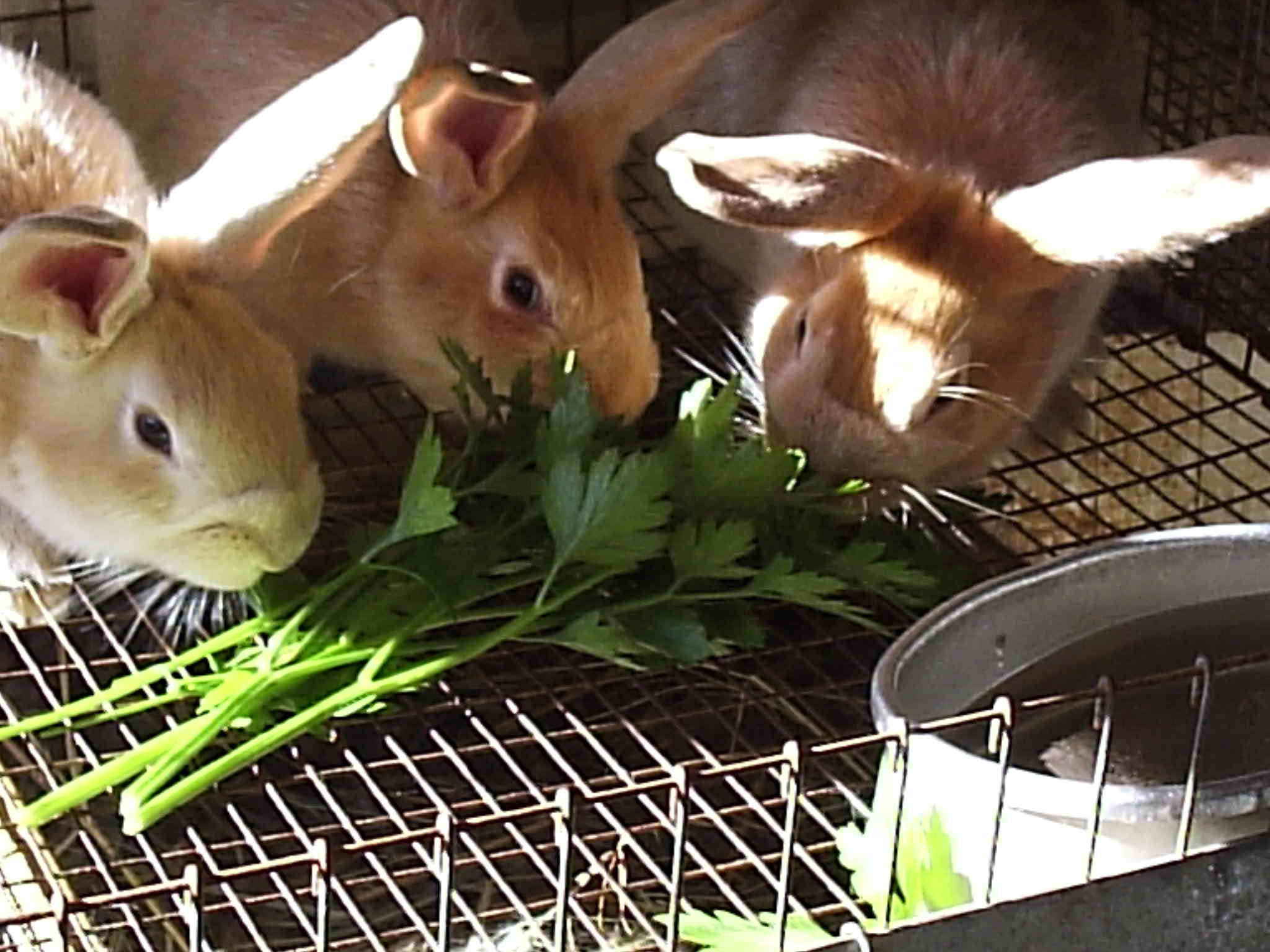
Your rabbit can enjoy many herbs that are both tasty and beneficial for their health. When considering what herbs can rabbits safely eat, it’s important to know that each herb has its advantages, from aiding digestion to boosting the immune system.
Basil
Basil is a great herb for rabbits. It has a mild flavor that most rabbits enjoy. Basil is rich in essential vitamins and minerals. It also has properties that can help reduce inflammation and promote healthy digestion.
I often give my rabbit a few fresh basil leaves as a treat. When introducing basil to your rabbit, start with small amounts to ensure they like it and can digest it well.

Coriander
Coriander, also known as cilantro, is another herb rabbits can eat safely. It’s packed with vitamins A, C, and K, which are great for your rabbit’s overall health. Plus, it has a fresh taste that many rabbits find appealing.
Coriander can help improve digestion and has antibacterial properties. I always rinse the leaves thoroughly before feeding them to my rabbit to remove pesticides.

Mint
Mint is not only refreshing but also beneficial for rabbits. It can help with digestion and has a calming effect on the stomach. Fresh mint leaves are a favorite in my bunny’s diet. Giving mint in moderation is important because too much can cause digestive upset.

Parsley
Parsley is a nutrient-rich herb that is safe for rabbits to eat. It is high in vitamins A, C, and K and contains iron and folate. The strong flavor of parsley is usually well-received by rabbits. It has diuretic properties, so it’s best to give it in moderation. I like to add a few sprigs to my rabbit’s regular greens to provide variety.

Dill
Dill is another herb that rabbits can safely eat. It supports digestive health and is rich in vitamin C, essential for a rabbit’s diet. My bunny loves the slightly sweet and tangy flavor of dill. Like other herbs, I recommend adding it to your rabbit’s diet gradually and in small amounts. Fresh dill can be a nice addition to their regular greens.
By offering these herbs, you can ensure your rabbit has a varied and healthy diet. Always introduce any new food slowly to monitor for any adverse reactions. This way, your rabbit can enjoy the benefits without any risks.

Here’s an additional video about herbs for rabbits.
By: Sarah’s Binky Bunnies
What Herbs Can Rabbits Safely Eat: Herbs to Give in Moderation
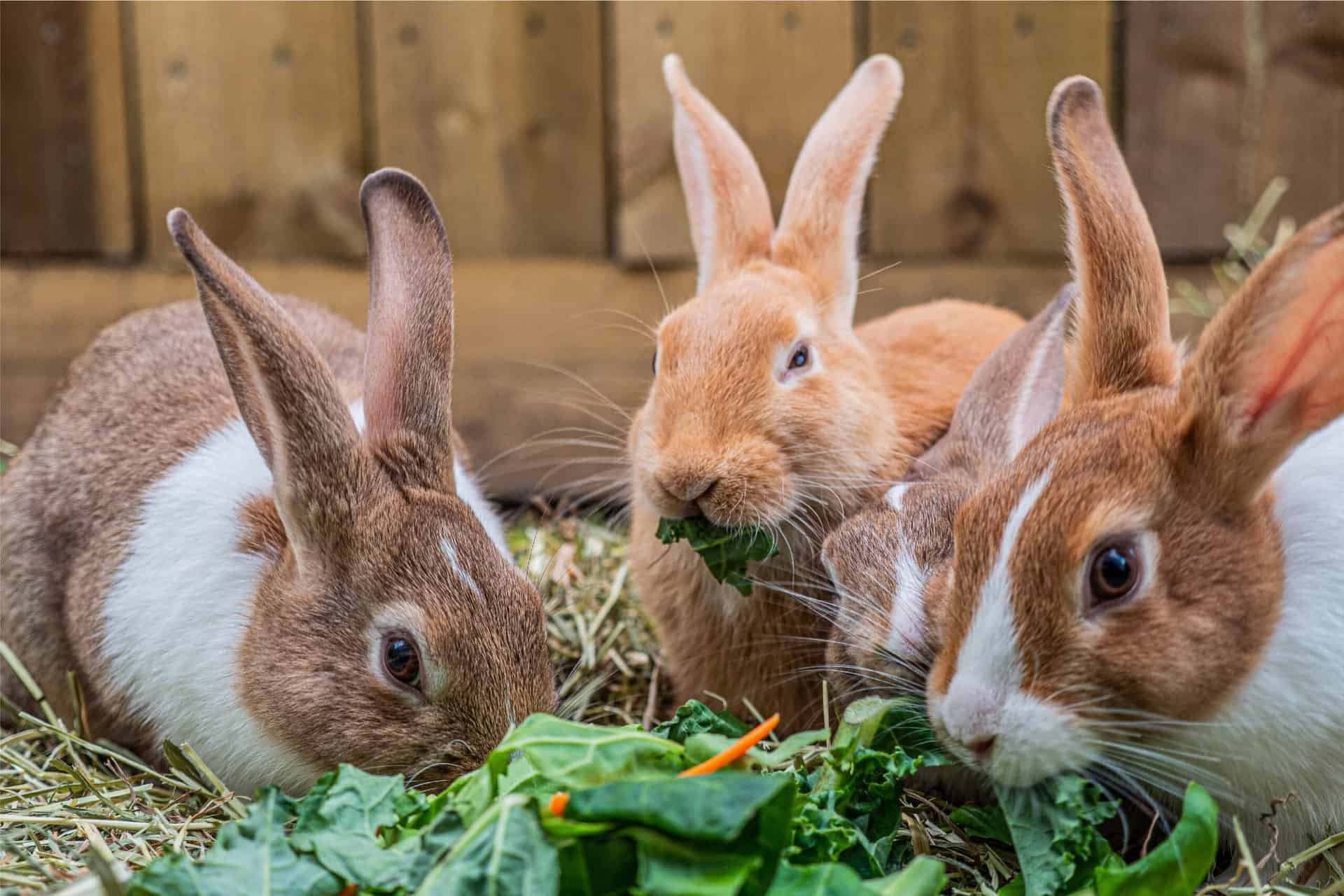
When feeding your rabbit certain herbs, it’s important to use moderation. Some herbs can offer great benefits but should be given in a manageable amount. Below, I’ll cover three herbs that should be fed in controlled portions.
Cilantro
Cilantro is a herb that many rabbits enjoy. It’s rich in vitamins like A, C, and K and provides essential minerals. Though it offers many health benefits, it should be given in moderation. Too much cilantro can lead to digestive upset, causing diarrhea or bloating in rabbits. I usually give my rabbit a few sprigs several times a week. It is helpful to keep their diet varied with other greens like romaine lettuce and parsley.

Rosemary
Rosemary can be a great addition to your rabbit’s diet. It has calming properties and can help with anxiety and stress. However, rosemary has a strong flavor and smell, which might appeal to only some rabbits.
Moderation is key here because rosemary is also quite high in calcium. Excessive calcium can lead to bladder stones in rabbits. I like to offer small sprigs of rosemary once a week as a treat and to keep my bunny’s diet interesting.

Thyme
Thyme is another herb safe for rabbits but should be given sparingly. It’s known for its antibacterial properties and can boost the immune system. Thyme is also rich in fiber, which is good for digestion.
On the flip side, too much thyme can overwhelm your rabbit’s digestive system, causing gas or discomfort. I recommend giving a small bunch of thyme no more than twice a week to ensure my rabbit stays healthy and happy.

Herbs to Avoid: What Not to Feed Your Rabbits
While many herbs are safe and healthy for rabbits, some can be harmful and should be avoided. Below, I’ll focus on three specific herbs that can pose risks.
Chives
While Chives might seem like a harmless herb, they are dangerous for rabbits. Chives belong to the same family as onions and garlic, which are toxic to rabbits. Eating chives can cause hemolytic anemia, leading to serious health problems.
Even small amounts of chives can disrupt a rabbit’s digestive system. Symptoms to watch out for include lethargy, loss of appetite, and changes in their stool. If you suspect that your rabbit has ingested chives, it is important to contact a vet immediately.
Avoid giving food containing chives or chive remnants to keep your rabbit safe. Always check ingredients if you’re sharing human food with your rabbit, and ensure they don’t have access to garden chives.
Onion Greens
Onion greens are another herb that should be kept away from rabbits. These greens contain thiosulphates, which are toxic to rabbits and can damage their red blood cells. This can result in hemolytic anemia, which can be life-threatening.
Symptoms of onion green poisoning include weakness, pale gums, and loss of appetite. Due to their toxicity, removing any onion plants or discarding parts from areas where your rabbit might wander is best.
Always double-check the contents of any meals you might share with your rabbit to ensure no onion greens are present. This simple step can prevent accidental ingestion and keep your rabbit healthy.
Leeks
Like chives and onion greens, Leeks are part of the Allium family and pose similar risks to rabbits. They contain harmful substances that can lead to hemolytic anemia.
If your rabbit consumes leeks, they may exhibit lethargy, decreased appetite, and gastrointestinal issues. This requires an immediate visit to the vet.
To keep leeks out of your rabbit’s diet, do not plant them in your garden or store them where your rabbit can access them. Always be mindful of the ingredients when feeding your rabbit anything besides their regular food.
Garden Safety for Rabbits
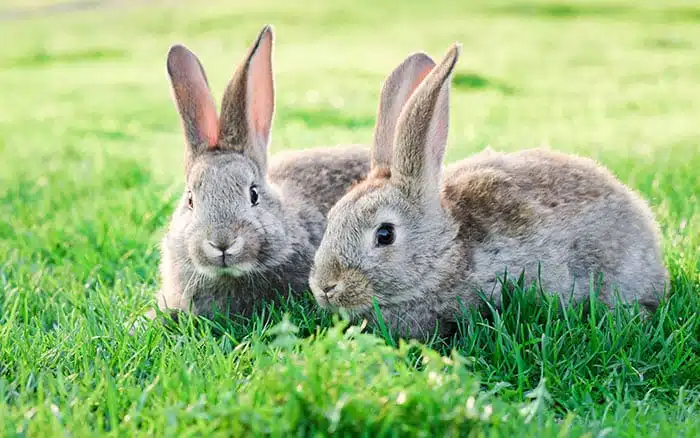
When letting your rabbit roam in the garden, it’s important to consider their safety. Two key areas to focus on are avoiding pesticides and ensuring the plants are non-toxic.
Pesticide Considerations
I always double-check that no pesticides or chemicals are used in the garden. Pesticides can be very harmful to rabbits, causing sickness or even worse. If you use any treatments, choosing organic or rabbit-safe options is best.
Wash any vegetables or herbs thoroughly before giving them to your rabbit, even if they come from a trusted source. If you need to find out whether a product is safe, it’s best to consult a vet with rabbit experience. This way, you can ensure you’re not unintentionally exposing your furry friend to dangerous substances.
Non-Toxic Plantings: Plant What Herbs Can Rabbits Safely Eat
It’s crucial to plant only non-toxic herbs and greenery. Some safe options include mint, basil, thyme, sage, and fennel. These herbs can benefit your rabbit’s health in different ways.
For instance, mint can help digestion, and basil is an anti-inflammatory. Be cautious with plants that are toxic to rabbits. Avoid placing or planting harmful plants such as foxglove or nightshade in the garden area. These can lead to serious health issues if ingested. Ensure your garden is a haven where your rabbit can explore and enjoy without the risk of encountering dangerous plants.
Here’s a bonus video about plants that are safe for rabbits.
By: Little Smile131
What Herbs Can Rabbits Safely Eat: Incorporating Herbs into a Rabbit’s Diet
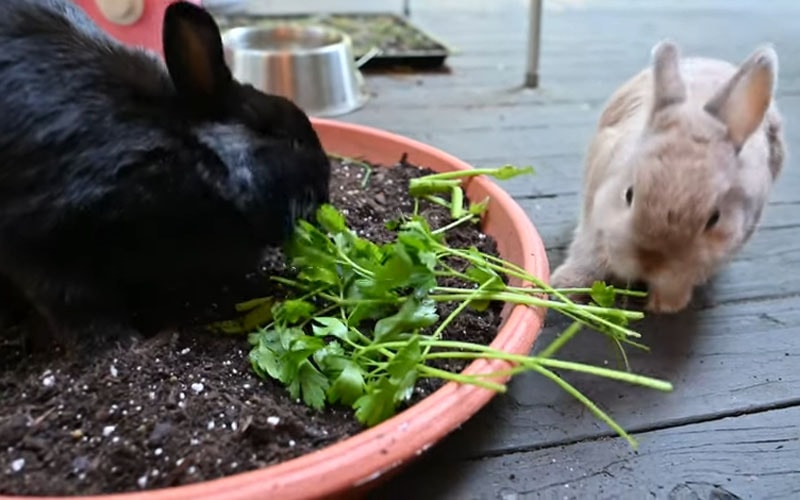
Introducing herbs into a rabbit’s diet can enrich their health and add variety. Ensuring the herbal additions are fresh and properly prepared and sticking to appropriate serving sizes is crucial for their well-being.
Freshness and Preparation
Fresh herbs are the best choice for your rabbit. They retain the most nutrients and are more appealing to bunnies.
Always wash herbs thoroughly to remove any pesticides or dirt. Organic herbs are preferable because they haven’t been treated with chemicals that could harm your rabbit.
When introducing new herbs, start slowly. Add a small amount to see how your rabbit reacts. Some rabbits may be sensitive to certain herbs, so observation is key.
Chop or tear herbs into smaller pieces to make them easier for bunnies to eat. This also helps to blend them into their regular diet more seamlessly. Consider rotating different herbs to provide a variety of flavors and nutrients. Popular herbs include basil, cilantro, and mint.
Serving Sizes
It’s important to remember that herbs should only be a small part of your rabbit’s diet. Their primary diet should consist of about 85% Timothy hay and 1/4 to 1/2 cup of rabbit pellets daily.
Add 2 cups of fresh herbs (around two handfuls) or 1 cup of dried herbs daily. This balance ensures that your rabbit gets the right fiber and nutrition.
Watch for any changes in your rabbit’s behavior or droppings. Consistent droppings and a happy, active bunny are good signs. You can adjust serving sizes as needed by monitoring their intake and reactions. Adding herbs like lavender, which has beneficial properties, can support your rabbit’s overall health if done correctly.
Monitoring Your Rabbit’s Health
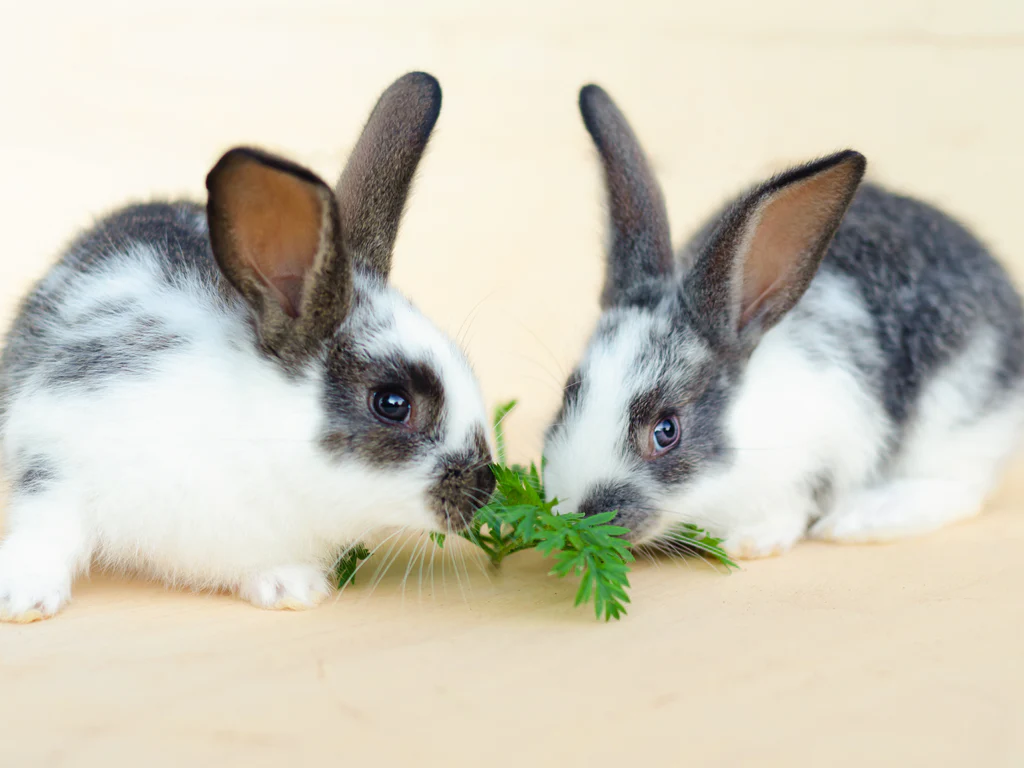
Keeping an eye on your rabbit’s health is crucial, especially when introducing new herbs to its diet. Watch for signs of good digestion and be aware of any common digestive issues that might arise.
Signs of Good Digestion
A rabbit with good digestion is usually alert and active. One of the first things I look for is regular, well-formed droppings. Healthy droppings should be round, firm, and uniform in size.
I also check if my rabbit has a hearty appetite and is drinking water regularly. My rabbit’s fur must remain smooth and shiny, which can signify proper nutrient absorption. Lastly, I ensure that my rabbit is not bloated or lethargic and has no signs of discomfort while eating or moving.
Common Digestive Issues
When introducing new herbs, I watch for any signs of digestive trouble. Diarrhea is a common issue, which can cause dehydration if not addressed quickly. Changes in droppings, such as becoming loose or runny, signal a problem.
Gas is another issue to watch for, as it can cause bloating and discomfort. If my rabbit stops eating or seems in pain, it might suffer from gastrointestinal stasis, which needs immediate attention. I also monitor my rabbit for sudden weight loss or gain, which can indicate improper digestion or other health issues.
Ensuring a Safe and Nutritious Herb Diet for Your Rabbit
Understanding what herbs can rabbits safely eat is a key part of providing a healthy and varied diet for your furry friend. By incorporating safe herbs like parsley, basil, cilantro, dill, and mint, you can offer your rabbit a tasty treat and boost their overall health. These herbs can enhance your rabbit’s diet with essential vitamins and minerals, promote good digestion, and even add excitement to mealtime. However, being aware of harmful or toxic herbs to rabbits is equally important.

Avoiding dangerous herbs like chives, onion greens, and leeks will help keep your bunny safe and healthy. Additionally, ensure that the herbs you provide are free from pesticides and non-toxic. With a thoughtful approach to selecting and introducing herbs, you can ensure that your rabbit enjoys a balanced, nutritious diet while exploring a world of new flavors.
Remember to always start with small amounts, watch for any adverse reactions, and consult your vet with any concerns. By keeping these guidelines in mind, you’ll be well on your way to providing your rabbit with a delicious and healthy herb-filled diet.
Frequently Asked Questions
Which Herbs Are Safe for My Bunny to Snack on Regularly?
Basil, parsley, and dill are great choices. They are packed with vitamins and can be given daily. Mint is also safe and quite popular among rabbits. You can find out more about safe herbs here.
How Often Can a Rabbit Have Mint as a Part of Their Meal?
Mint can be given several times a week. This herb helps with digestion and is safe in moderate amounts. Ensure you do everything correctly, as variety in a rabbit’s diet is important.
Can I Include Dried Herbs in My Rabbit's Feeding Routine, and What Kinds Should I Use?
Dried herbs like oregano, thyme, and rosemary are fine. They should be given in smaller quantities than fresh herbs. Always ensure they are free from additives or chemicals before feeding your rabbit.
Come Hop with Us on Social Media!
Do you adore your bunny? So do we at The Rabbit Hop!
Find us online for:
- Bunny Fun: Cute videos, interesting facts, and tips for keeping your bunny happy!
- Top Product Reviews: Find out what’s best for your fluffy friend.
- Bunny Community: Meet and connect with other bunny lovers just like you
Follow us on:
Let’s make your bunny the happiest hopper on the block!



